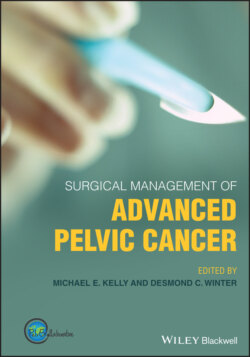Читать книгу Surgical Management of Advanced Pelvic Cancer - Группа авторов - Страница 42
Background
ОглавлениеCombined‐modality therapy was a paradigm shift in managing locally advanced rectal cancer (LARC) in the latter part of the twentieth century. Neoadjuvant chemoradiotherapy (nCRT; long‐course radiotherapy with concomitant fluoropyrimidine‐based chemotherapy) then interval total mesorectal excision (TME) is the standard of care for patients with bulky cT3/4 tumors or predicted node‐positive disease in most countries. Short‐course radiotherapy (five fractions without chemotherapy) is also an evidence‐based standard and was pioneered in Scandinavia, the Netherlands, and the UK. Several large studies have demonstrated superior disease‐related outcomes with neoadjuvant therapy over surgery alone [1–4]. Following systematically taught TME and widespread adoption of tri‐modality therapy, five‐year local recurrence rates decreased to 5% or less [5]. However, long‐term overall survival (OS) did not improve in parallel and the leading cause of rectal‐cancer‐related death is now distant disease failure, with approximately 20–30% of patients developing distant metastases despite receiving postoperative chemotherapy in some countries [6]. Increasing emphasis has been placed on optimized systemic therapy to improve long‐term OS.
In the USA and some European countries adjuvant chemotherapy has been recommended in the management of LARC. This is largely based on extrapolation from the results of trials in colonic cancer demonstrating improved disease‐free survival (DFS) and OS. Oncologists generally estimate that adjuvant fluoropyrimidine‐based chemotherapy reduces the relative risk of systemic recurrence of colon cancer by one‐third, with oxaliplatin adding another 5–6% benefit [7, 8]. Early trials in rectal cancer observed similar survival advantages; however, these trials were conducted prior to the introduction of neoadjuvant therapy [9, 10]. The role of adjuvant chemotherapy in the modern era of nCRT is less defined. ADORE—a large phase II Korean trial—randomized patients post nCRT to four cycles of adjuvant 5‐fluorouracil (5‐FU) or FOLFOX (5‐FU, leucovorin, and oxaliplatin) and demonstrated improvement in DFS [11]. Four randomized European trials have failed to demonstrate a significant survival benefit [12–15]. Notably, these trials demonstrated that compliance with adjuvant chemotherapy is poor following rectal cancer surgery. In the largest of these studies, the European Organization for Research and Treatment of Cancer (EORTC) 22921 trial, over half of patients did not complete the intended four cycles [15]. Any apparent absence of survival advantage with adjuvant chemotherapy may be related, in part, to poor tolerance of postoperative treatment. Furthermore, a meta‐analysis evaluating the impact of time from surgery to adjuvant therapy on survival in colorectal cancers demonstrated that a four‐week increase in time was associated with a significant decrease in DFS (hazard ratio [HR] 1.14, 95% confidence interval [CI] 1.10–1.18) [16]. Alternative approaches are required to optimize delivery. Total neoadjuvant therapy (TNT) has emerged as an attractive alternative strategy—systemic chemotherapy given before nCRT (i.e. induction chemotherapy) or after it (consolidation chemotherapy) in the preoperative setting.
